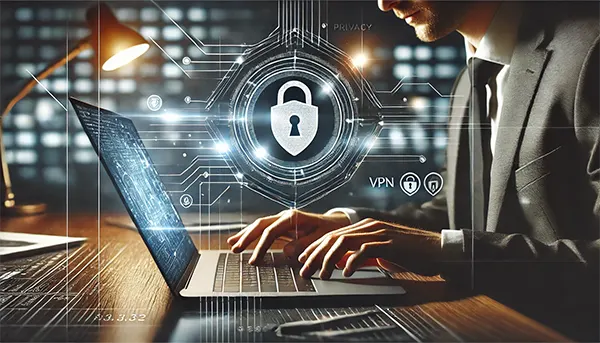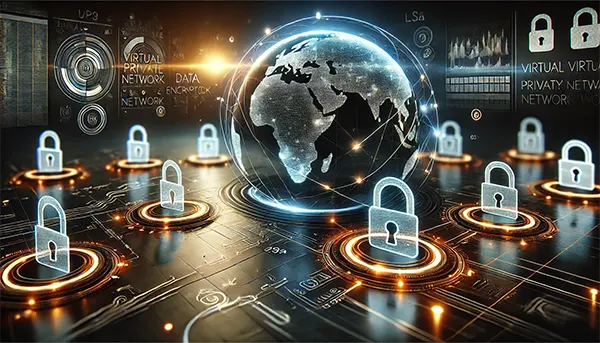VPNs for Data Protection in 2025: A Complete Guide

Virtual Private Networks (VPNs) have become an essential tool for protecting data in today’s increasingly digital world. With the rise of cyber threats and the growing reliance on the internet for personal, business, and governmental activities, VPNs have gained significant importance. As we enter 2025, the role of VPNs in safeguarding privacy and securing data from malicious actors continues to evolve. In this article, we explore the current state of VPNs and how they are shaping the future of data protection.
What is a VPN and How Does It Work?
A Virtual Private Network (VPN) is a service that allows you to create a secure connection over the internet, effectively masking your online activities. VPNs work by routing your internet traffic through a secure server, making it appear as if your connection originates from a different location. This encryption process protects your data from hackers, internet service providers, and other entities that might want to track your online behavior.
VPNs offer various encryption protocols, which have become more robust over the years. The most commonly used ones are OpenVPN, L2TP/IPsec, and IKEv2. Each of these protocols has its own advantages, with OpenVPN being the most popular due to its balance between security and speed. VPNs also offer features like kill switches, which immediately disconnect the user from the internet if the VPN connection drops, ensuring that no data is exposed.
In 2025, VPN technology has advanced significantly, offering more robust encryption protocols, faster speeds, and better user experiences. VPN providers have introduced features like multi-device support, split tunneling, and dedicated IP addresses, making VPNs more adaptable for various needs. Whether you are accessing sensitive business information, streaming content, or browsing the web, a VPN ensures that your connection remains private and secure. The increase in privacy laws around the world is another factor driving the adoption of VPNs, as individuals and businesses seek to ensure compliance with data protection regulations.
The Basic Functionality of a VPN
VPNs are becoming an indispensable tool for protecting data in our increasingly connected world. Their ability to create a secure connection between users and the internet has made them a must-have for individuals and businesses alike. As cyber threats continue to evolve, so does the technology behind VPNs. For example, many VPN providers now offer improved security features, such as military-grade encryption, to ensure that users’ data remains protected from malicious attacks.
One of the key benefits of using a VPN is its ability to provide online anonymity. By masking your IP address, a VPN makes it much harder for websites, advertisers, and even hackers to track your online activity. This is particularly useful for those who want to protect their personal information from data breaches or online surveillance. VPNs are also beneficial for anyone who wants to bypass geographic restrictions and access content that may be unavailable in their region.
Another important aspect of VPNs is their ability to secure public Wi-Fi connections. Public networks, such as those found in airports, cafes, or libraries, are notorious for being vulnerable to cyberattacks. Without a VPN, your data could be intercepted by hackers who are on the same network. A VPN encrypts your internet traffic, ensuring that your sensitive information remains secure, even when using unsecured Wi-Fi networks.
The Growing Importance of VPNs in 2025
As cyber threats grow in sophistication, the need for VPNs has never been more critical. In 2025, with the increase in data breaches, identity theft, and surveillance, individuals and businesses alike are turning to VPNs to protect their sensitive information. VPNs provide an extra layer of security that is essential for those using public Wi-Fi networks, which are notorious for being vulnerable to attacks. Without a VPN, it becomes easier for cybercriminals to intercept your data, including login credentials and personal information, making public networks highly unsafe.
For businesses, VPNs offer a way to ensure that employees working remotely or accessing company data from different locations can do so safely. With more companies adopting hybrid or fully remote work models, the use of VPNs has become an indispensable part of their cybersecurity strategies. This is especially true for sectors like banking, healthcare, and e-commerce, where data protection is a top priority. By using VPNs, organizations ensure that their communications remain confidential and that their employees can securely access internal networks from anywhere in the world.
Another major benefit of VPNs is their ability to help users bypass geo-restrictions. Many online services, including streaming platforms, restrict content based on your geographical location. With a VPN, users can connect to a server in a different country and access the content they wish. As more people turn to streaming services for entertainment, the demand for VPNs that offer reliable and fast connections is growing rapidly. As technology evolves, more VPN providers are focusing on optimizing their servers for streaming, ensuring that users experience minimal buffering and fast speeds.
Why VPNs Are Vital for Online Privacy
VPNs are becoming increasingly vital for ensuring online privacy. With the rise in data breaches, identity theft, and government surveillance, people are more concerned about how their personal information is being used. VPNs provide a way to protect sensitive data from being intercepted by unauthorized third parties, such as hackers, marketers, and even government agencies. This is especially important as governments around the world push for more surveillance and control over online activities.
For individuals, VPNs offer peace of mind by securing their browsing habits, making it difficult for anyone to track their online activity. Whether it’s for casual browsing, shopping, or banking, VPNs help maintain a layer of privacy. Additionally, VPNs allow users to bypass censorship in certain regions, giving them access to unrestricted content from across the globe.
As the demand for privacy and security grows, VPNs are adapting to meet users’ needs. In 2025, we expect to see more VPN providers introducing innovative features to enhance security and privacy. For example, some VPN services now offer multi-hop connections, which route traffic through two or more VPN servers, further increasing anonymity and reducing the chances of being tracked.

Challenges and Future of VPNs
While VPNs have proven to be an effective means of protecting data, they are not without their challenges. One of the most significant issues faced by VPN users is speed. As encryption levels increase, the time it takes to establish a secure connection can sometimes lead to slower internet speeds. However, in 2025, many VPN providers have made strides in optimizing their services to offer faster connections without compromising on security. Newer technologies, such as WireGuard, have been developed to offer better performance with strong encryption, reducing the lag experienced by some users when connecting to VPN servers.
Another concern is the growing number of jurisdictions introducing laws that challenge VPN usage. Some governments have imposed restrictions or even outright bans on VPN services in an effort to control online activity. For example, in countries with strict internet censorship laws, VPNs have become a tool for users to bypass government-imposed firewalls. However, some governments are cracking down on the use of VPNs, requiring VPN providers to comply with regulations that could undermine the level of privacy they offer. In response to these challenges, VPN providers are continually evolving their technology to ensure users can maintain their anonymity and security, even in restrictive environments.
Looking forward, VPN technology will likely continue to evolve, with enhanced features such as AI-driven security, improved geo-restriction bypass methods, and integration with other privacy-focused tools. As more individuals and organizations prioritize privacy, the VPN market will only expand, ensuring that these services remain at the forefront of data protection strategies. Companies may also look to incorporate multi-layered security solutions that go beyond traditional VPNs, including additional encryption methods and advanced threat detection systems to stay ahead of cybercriminals.
What to Expect from VPNs in the Coming Years
As we move further into 2025, the VPN landscape is expected to continue evolving. VPNs are becoming more sophisticated, offering improved encryption protocols, faster speeds, and enhanced user experiences. Many VPN providers are also focusing on user-friendly interfaces, making it easier for people to navigate complex security options without sacrificing performance. This will help increase adoption rates as more individuals and businesses realize the importance of securing their online activities.
We can also expect to see more integration of AI and machine learning in VPN services. These technologies could be used to detect and mitigate emerging threats in real-time, ensuring that VPNs remain one step ahead of cybercriminals. Additionally, AI could be used to automatically optimize the best VPN servers based on the user’s location and internet speed, providing a seamless and efficient browsing experience.
Finally, as concerns about online privacy and data security continue to grow, VPNs will play a crucial role in shaping the future of the internet. As governments and corporations collect more personal data, individuals will increasingly turn to VPNs as a way to protect their online identity and privacy. The future of VPNs looks promising, with continuous advancements to ensure that data remains secure and users’ privacy is upheld.
